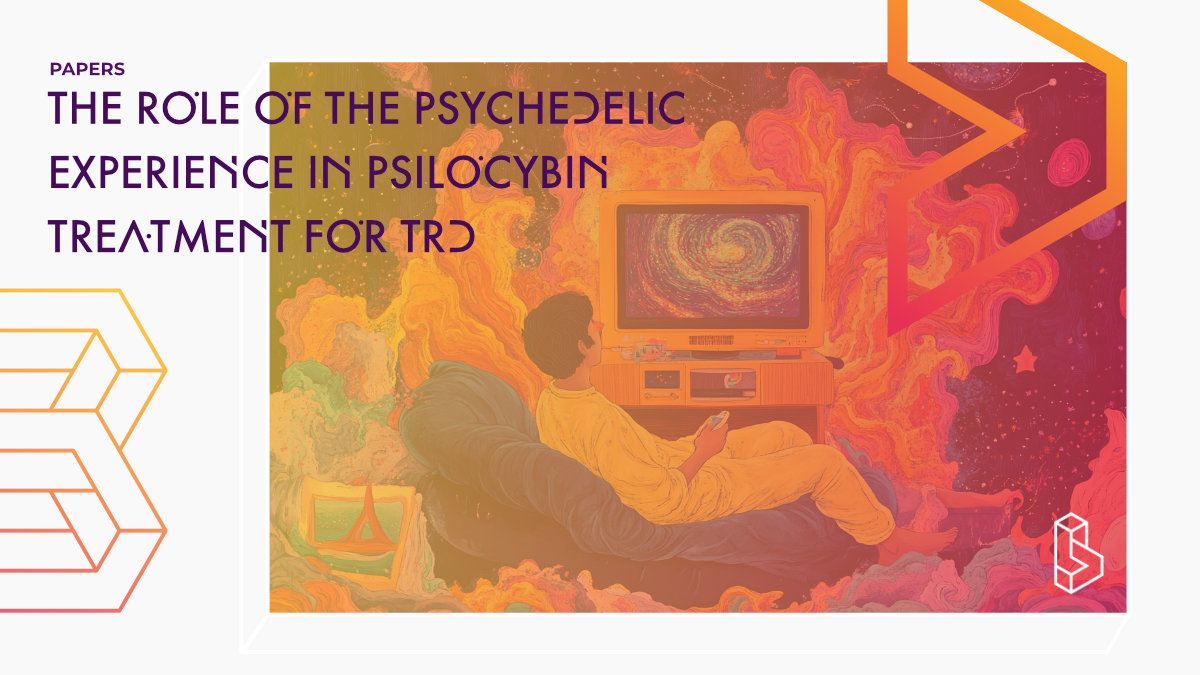This re-analysis of the COMPASS Phase IIb trial (n=233) investigates the relationships between psilocybin dose, psychedelic experiences, and therapeutic outcomes in treatment-resistant depression. Participants received a single dose of 25, 10, or 1 mg of psilocybin (COMP360) with psychological support. Higher doses produced stronger psychedelic effects, and reductions in depression (MADRS scores) at Week 3 correlated most strongly with dimensions of Oceanic Boundlessness (r = −0.508), Visual Restructuralization (r = −0.516), and Emotional Breakthrough Inventory (r = −0.637). Findings suggest the quality and intensity of psychedelic experiences mediate therapeutic outcomes and support dose-response mechanisms.
Abstract of The role of the psychedelic experience in psilocybin treatment for TRD
“Objective To determine the relationships between psilocybin dose, psychedelic experiences, and therapeutic outcome in treatment-resistant depression.
Methods For treatment-resistant depression, 233 participants received a single dose of 25, 10, or 1 mg of COMP360 psilocybin (a proprietary, pharmaceutical-grade synthesized psilocybin formulation, developed by the sponsor, Compass Pathfinder Ltd.) with psychological support. The resulting psychedelic experience (Five-Dimensional Altered States of Consciousness questionnaire [5D-ASC] and Emotional Breakthrough Inventory [EBI]) were measured. These proximal variables and outcome 3 weeks post-administration (change in Montgomery-Åsberg Depression Rating Scale [MADRS]) were explored using correlation analysis.
Results The mean intensity of psychedelic effects was dose-related, but distributions of scores for different doses overlapped considerably. Depression response correlated with select aspects of the psychedelic experience overall and for individual doses. At the 25 mg dose, 5D-ASC dimensions Oceanic Boundlessness (Pearson correlation coefficient r = −0.508) and Visual Restructuralization (r = −0.516), and EBI (r = −0·637) were the variables with the strongest correlation to the Week 3 change from Baseline in MADRS score.
Limitations The existence of correlation does not establish causation and exploratory findings require further replication, preferably in larger independent samples.
Conclusions The intensity of psychedelic experience overlaps widely across doses and mitigates the risk of unblinding to dose. Correlations between psychedelic experience and outcome suggest specificity in psilocybin’s mechanism of action. Quality and intensity of psychedelic experience may be a measure of pharmacodynamic effect and reveal an effective dose response phenomenon for single oral doses.”
Authors: Guy M. Goodwin, Scott T. Aaronson, Oscar Alvarez, Robin L. Carhart-Harris, Jamie Chai-Rees, Megan Croal, Charles DeBattista, Boadie W. Dunlop, David Feifel, David J. Hellerstein, Muhammad I. Husain, John R. Kelly, Namik Kirlic, Rasmus W. Licht, Lindsey Marwood, Thomas D. Meyer, Sunil Mistry, Ania Nowakowska, Tomáš Páleníček, Dimitris Repantis, Robert A. Schoevers, Hollie Simmons, Metten Somers, Emma Teoh, Joyce Tsai, Mourad Wahba, Sam Williams, Allan H. Young, Matthew B. Young, Sidney Zisook & Ekaterina Malievskaia
Summary of The role of the psychedelic experience in psilocybin treatment for TRD
Interest in serotonergic psychedelics, such as psilocybin, has grown due to their potential therapeutic applications in neuropsychiatric disorders. Prior studies suggest that psilocybin may alleviate symptoms of major depressive disorder (MDD), including cases classified as treatment-resistant depression (TRD). However, the exact mechanisms responsible for its therapeutic effects remain uncertain.
Psilocybin acts as a prodrug, metabolised into psilocin, which activates serotonin 5-HT2A receptors. Research using positron emission tomography has shown a positive correlation between 5-HT2A receptor occupancy, plasma psilocin levels, and the intensity of psychedelic experiences. These findings support the hypothesis that the subjective psychedelic experience may reflect the pharmacological action of psilocybin and predict therapeutic outcomes.
Previous studies indicate that certain dimensions of psychedelic experiences, measured through tools like the Five Dimensional Altered States of Consciousness (5D-ASC) and the Mystical Experiences Questionnaire (MEQ-30), correlate with clinical outcomes. Notably, the ‘Oceanic Boundlessness’ domain has been identified as predictive of improvement in depressive symptoms. However, these studies were often small and lacked rigorous blinding protocols.
This study, identified as COMP 001, aimed to address these limitations through a large-scale, randomised, double-blind trial. It explored the relationship between psilocybin dose, psychedelic experience intensity, and reductions in depressive symptoms in individuals with TRD.
Methods
Trial Oversight
Find this paper
The role of the psychedelic experience in psilocybin treatment for treatment-resistant depression
https://doi.org/10.1016/j.jad.2024.12.061
Paywall | Google Scholar | Backup | 🕊
Cite this paper (APA)
Goodwin, G. M., Aaronson, S. T., Alvarez, O., Carhart-Harris, R., Chai-Rees, J., Croal, M., ... & Malievskaia, E. (2024). The role of the psychedelic experience in psilocybin treatment for treatment-resistant depression. Journal of Affective Disorders.
Study details
Compounds studied
Psilocybin
Topics studied
Depression
Treatment-Resistant Depression
Study characteristics
Original Re-analysis
Placebo-Controlled
Active Placebo
Double-Blind
Randomized
Participants
233
Humans
Institutes
Institutes associated with this publication
COMPASS PathwaysCOMPASS Pathways is a publicly listed company (NASDAQ) that is developing psilocybin for treatment-resistant depression (TRD) for which it has completed a successful Phase IIb trial. COMPASS is one of the largest psychedelic companies and has received substantial investment from atai.
Compound Details
The psychedelics given at which dose and how many times
Psilocybin 1 - 25mg | 1x
Linked Research Papers
Notable research papers that build on or are influenced by this paper
Single-Dose Psilocybin for a Treatment-Resistant Episode of Major DepressionThis double-blind active-placebo controlled trial (n=233) tested the effect of a single dose of psilocybin (25/10/1mg) with supportive therapy for treatment-resistant depression. The primary endpoint at three weeks finds a significant reduction in depressive symptoms (MADRS, 12-point drop from baseline of 32) that was significantly greater in the 25mg group vs the 1mg (placebo) group (6.6 points larger drop). The response (>50% drop in MADRS score) in the 25mg group dropped from 37% at 3 weeks to 20% at 12 weeks.
Linked Clinical Trial
The Safety and Efficacy of Psilocybin in Participants With Treatment Resistant DepressionThe Safety and Efficacy of Psilocybin in Participants with Treatment Resistant Depression - a dose-ranging study.

